
EDITOR'S NOTE: This story was originally published in the April issue of GCU Magazine. The digital version of the magazine can be found here.
Photos by Ralph Freso
The excessively joyful sun streams through the classroom, reflecting off the cubbies and lending its light to Victory Autism Academy.
As if it needed to.
An ebullient Megan Walsh, exuberant in her smile, already lights up the room. The Grand Canyon University elementary education/special education junior is sitting at a school desk she’s too big for, gabbing with 9-year-old Jackson Dubee as he stacks wooden blocks from a plastic bucket.
It’s the first time she has visited the school since it moved into its new home on west Indian School Road, just down from GCU Golf Course in Maryvale, though she knows these children. She and the other aspiring special education teachers worked with them when the school nestled in its temporary home at the University as construction work was completed on the school.
“It’s honestly the most fulfilling thing I’ve done,” said Walsh of her work at the academy. “It’s hard to find passion in a lot of things.”
But she found passion in this.
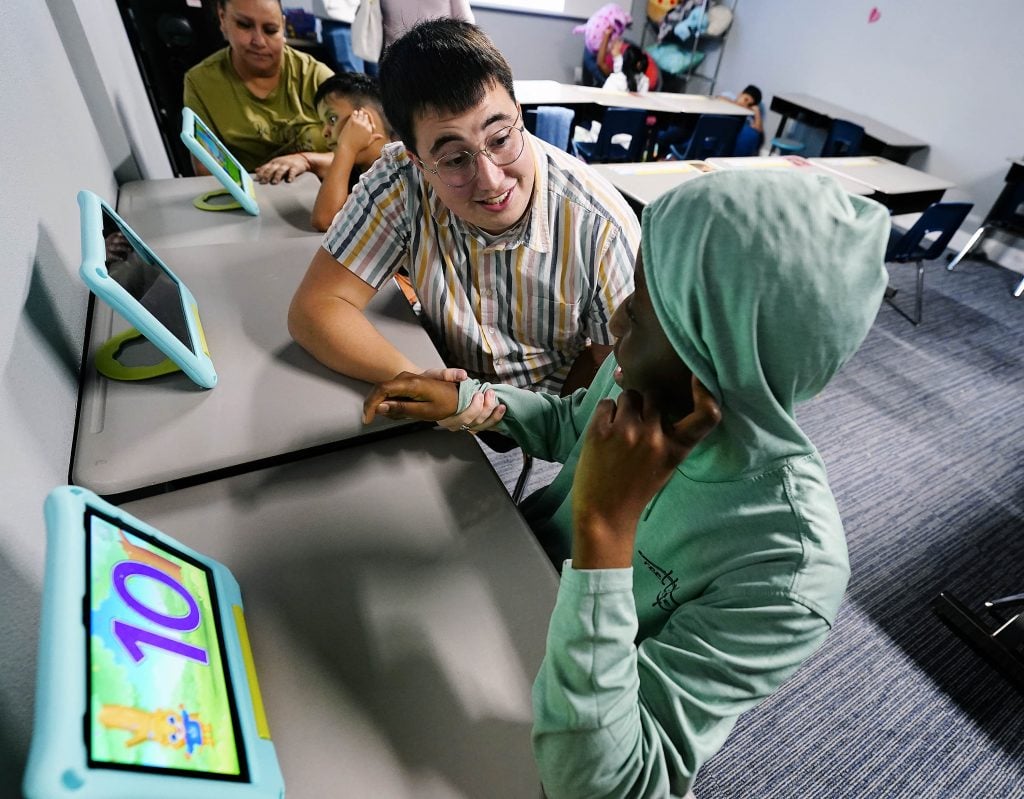
Walsh didn’t know what she wanted to do with her life when she was in high school. Then she volunteered with the Special Olympics and saw how excited and joyful the students were.
Working with neurodiverse youth, “Obviously, there are challenges,” she said. “But the reward is more fulfilling.”
Victory Autism Academy approached GCU just before the beginning of the school year, its founding CEO, Nick Schuerman, in a panic.
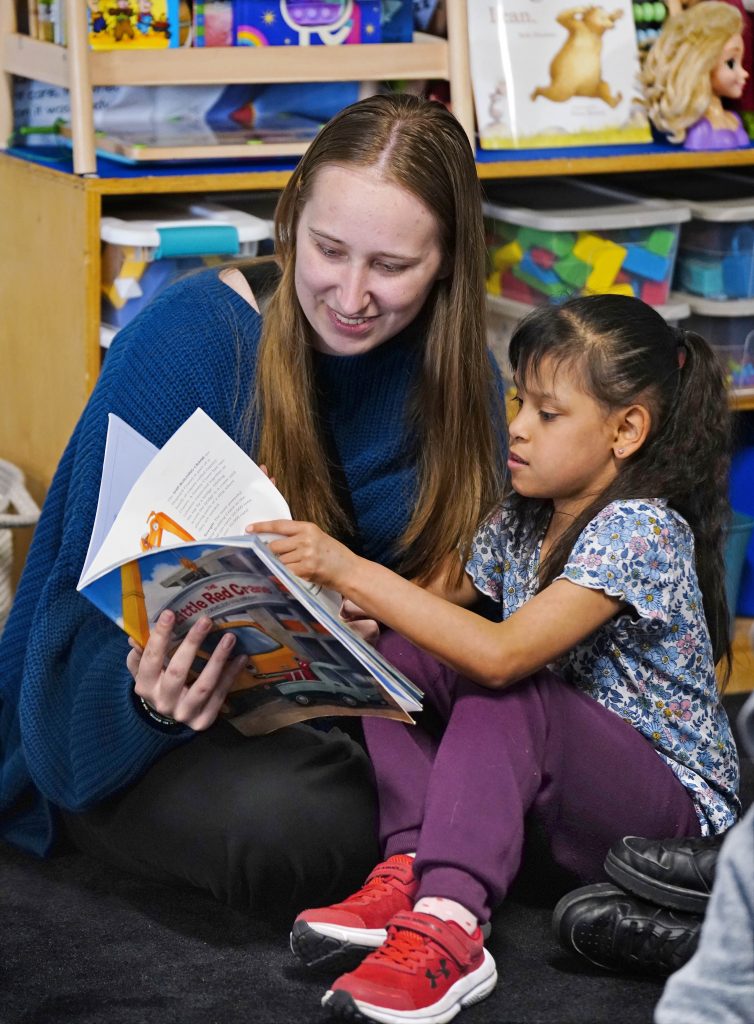
“We were a week away from starting school, and the city comes in and says, ‘You’ve got to shut down your construction,’” said Schuerman, who opened the academy’s first campus for children with autism in Goodyear after seeing district and charter schools fail to meet the needs of children with autism spectrum disorder, like his son, Conner.
Immediately, he thought of a trusted lifeline and dashed off an email to GCU President Brian Mueller: “Do you have any leads? Do you have any ideas for us? We’ve got nowhere to go.
“He called me the next day, and he had a bunch of people in his office. We essentially moved our entire school over to the second floor of Building 71,” and just like that, 100 students started their school year at GCU. “It was incredible. … We just had a lot of people really pour into us and help us out.”
It isn’t the first time the University has answered the community’s call.
“It’s another example of people coming to us and saying, ‘You’ve shown a desire to reach out and do special things with vulnerable populations. Will you do it?’ I keep saying, ‘Yes, we’ll do it,’” said Mueller.
Good-hearted people keep looking to GCU to help with bucket-filling work.
“It’s what excites me the most about this whole thing because that means they’re viewing us that way,” Mueller said. “They’re viewing us as people who have an interest in that.”
Mueller doesn’t see the University as only helping students with degrees and jobs. It’s about compassion and human flourishing. It’s about meaningful work.
Let's not get tired of doing good, because in time we'll have a harvest if we don't give up.
Galatians 6:9
“Ultimately, what it comes down to is, what should be the defining characteristics of a Christian university? And this should be one of the defining characteristics of a Christian university,” Mueller said of helping those who need it the most. “To be honest with you, I probably want that more than anything.
“We’re all saved by grace, and as a result of that, we’re going to extend grace, especially to those who are living in the most vulnerable living situations. That should be, part and parcel, what a Christian university is.”
Road to Victory
When College of Education assistant professor Jennifer Jakobi heard Victory Autism Academy would be housed on campus for a semester, she was thrilled for the dual major elementary education/special education students in her class who made their way to nearby Building 71 for an hour every Thursday among the bright faces of the academy’s children.
In the classroom, they had practiced developing math lessons for students with exceptionalities. But now, instead of working in theories, they had the chance to work with real-life students and see the results of their work.
“The interactions and the confidence that my students got just could not be duplicated in the GCU classroom. It was just a tremendously impactful experience,” said Jakobi, who shared her students’ research on how, at the beginning of class, 15% of the GCU students felt confident meeting the needs of someone with autism in the classroom but, by the end of the 15-week course, that confidence level soared to 94%.

Madison Sedlacek, in the academy’s new home on west Indian School Road, displays that newfound confidence in Jonathan Larkin’s life skills classroom, a light gray space dappled with stars on the wall, designated spaces marked with the words “sensory” and “independent,” and a poster detailing the classroom rules: “Have a calm body. Have a quiet voice.”
Sedlacek asks one of the students, “Can you show me 7 + 1?” After he places a number 8 on a card that also says 8, she follows up with: “Can you write 8?”
It’s a teaching method Larkin showed her.
He speaks about the nine different lesson plans for the class; each student’s needs are unique.
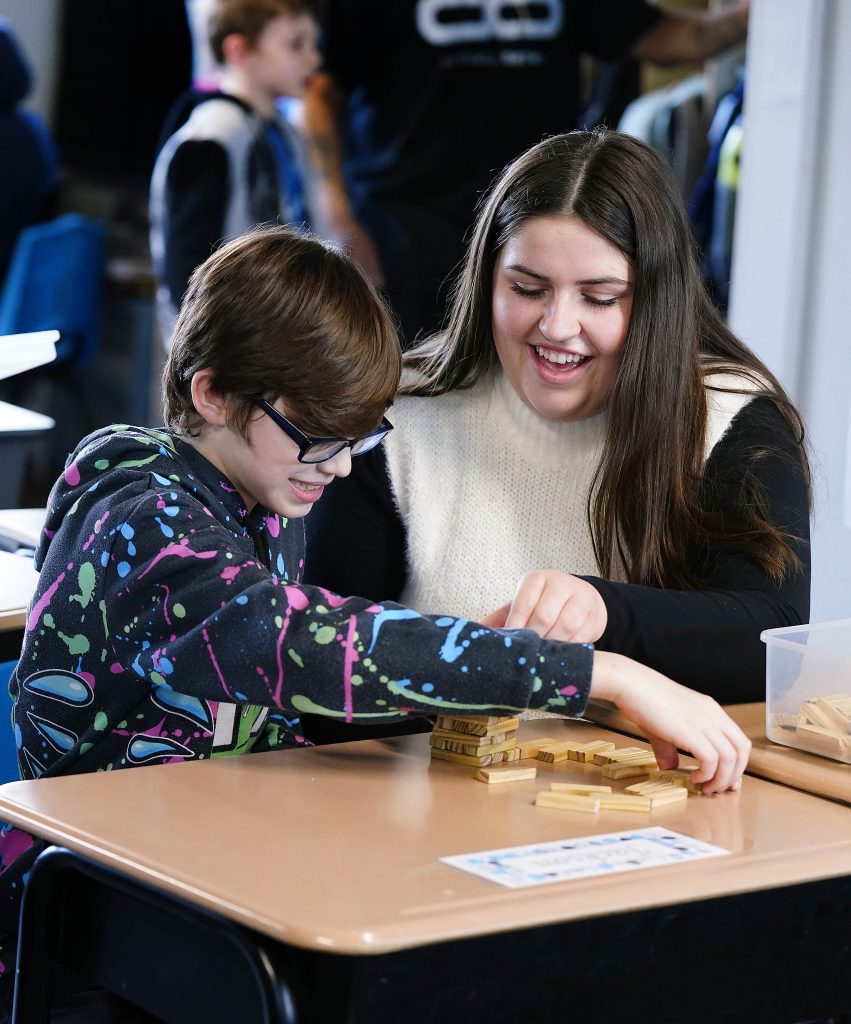
“This classroom is so important for kids like this because they’re able to get their needs met,” said Larkin, who can’t fully explain why he loves this work but shares how one student who didn’t talk when he first came to the school now does. “It’s the most satisfying thing in the entire world.”
It was a sentiment shared by aspiring special education teacher Beth Donat at GCU’s Undergraduate Research Symposium in December.
“I worked with a little boy every single week I was in there. He had a communication device, and that first week I was in there, I couldn’t really talk with him because I didn’t know how to use this device,” said Donat, whose voice broke as she started to cry. “But two weeks ago, I was able to have a full-fledged conversation with him, and the smile on his face when I was able to communicate with him will forever be in my heart and is truly the reason I want to be a special education teacher.”
Jakobi added that, like Donat, “so many students walked away from this feeling like their God-given purpose was to teach students with special needs.”
GCU helped facilitate that.
“The students were so kind to us. They loved our kids,” said Larkin. “We were so lucky to be at GCU.”
Fostering hope
A little more than two years ago, Mueller heard about the Fostering Futures Scholarship, designed to help another vulnerable population – foster care students.
According to National Foster Youth Institute data, only about half of former foster children complete high school, only 2 to 6% earn a two-year degree, and 3 to 4% a four-year degree.
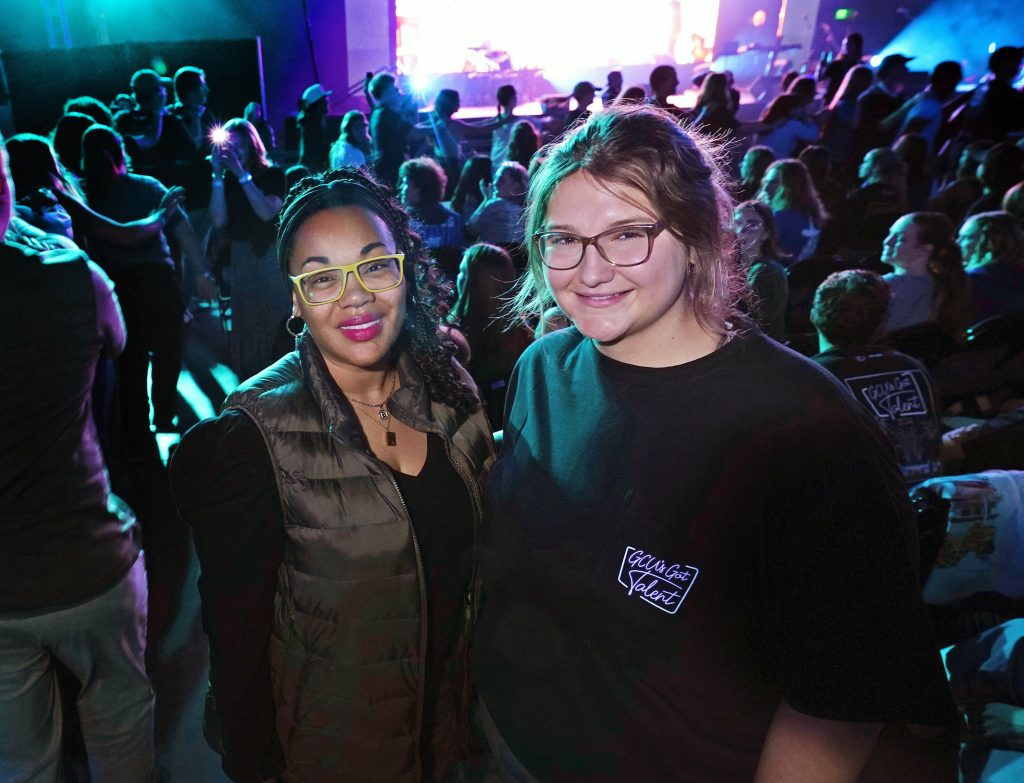
Mueller didn’t know how GCU could help; he just knew the University would help.
He approached then head of the Arizona Department of Child Safety Mike Faust and asked how many foster students GCU might accommodate.
“This cat just signed up for like 120 grand for each kid and had no clue how many kids he was going to serve. It was irrelevant to him – he didn’t care because he has a heart for serving,” said Faust at the Foster Care Summit on campus in 2022.
Just two years after the program began, the first foster student supported by the initiative – she didn’t meet Arizona requirements for the Fostering Futures Scholarship but received support from outside donors – is on track to graduate with a nursing degree this spring.
GCU just has a great heart for this community.
Brandi Turner, Fostering Futures student administrator
Sixty-two students attend GCU under the Fostering Futures program. Fifteen receive the full-ride Fostering Futures Scholarship funded by the University – it covers tuition and 12 months of room and board – with a portion of the housing cost covered by the Department of Child Safety. The Ramsey Foundation Scholarship supports some out-of-state students, and other outside donors also support the program.
“Students have that opportunity to come here without worrying about that debt,” said Brandi Turner, Fostering Futures student administrator.
And GCU supports those students in other ways.
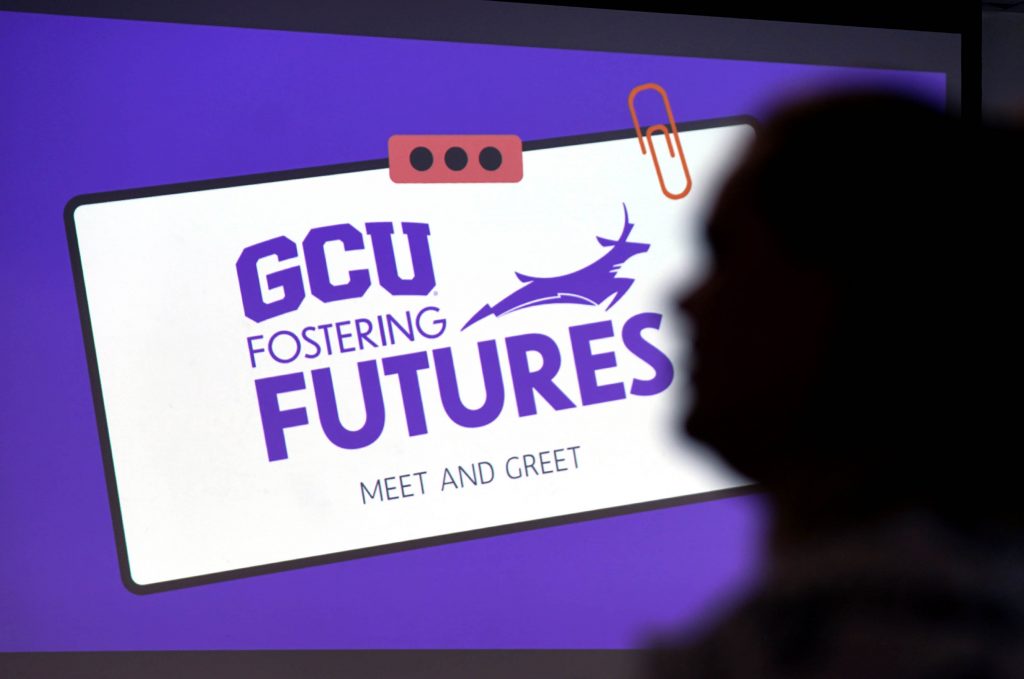
Program administrators meet regularly with students, who also gather at Monday meetups to hear from campus departments about the resources available to them. Fostering Futures Scholarship recipients also are assigned a mentor.
They gather for social activities, too, such as a recent trip to Tonto Natural Bridge, and celebrated the holidays with Friendsgiving and a Christmas party that included gifts from GCU CityServe, another campus initiative to help the community that distributes donated goods from major retailers to those in need.
“We just created that community – that family,” said Turner, who has worked in the field for 20 years and is amazed by how the University has embraced former foster care youth. “Everyone has been so gracious and just so mindful of our program.
“GCU just has a great heart for this community.”
Acting in faith
Sara O’Meara and Yvonne Fedderson’s hearts were in show business in the 1950s, when they played Ricky and David Nelson’s girlfriends in the popular sitcom “The Adventures of Ozzie & Harriet.”
But it wasn’t show business that would give meaning to their lives. It was a USO goodwill tour.
The Hollywood starlets were excited to entertain U.S. troops in Korea, Okinawa and Japan right after the Korean War, but their hopes were dashed when they arrived in Tokyo as a typhoon hit, the mean weather shutting down the city in what O’Meara recalls was one of the coldest winters on record.
She also remembers, “We weren’t supposed to leave the hotel,” but, young, adventurous and a little defiant, they did.
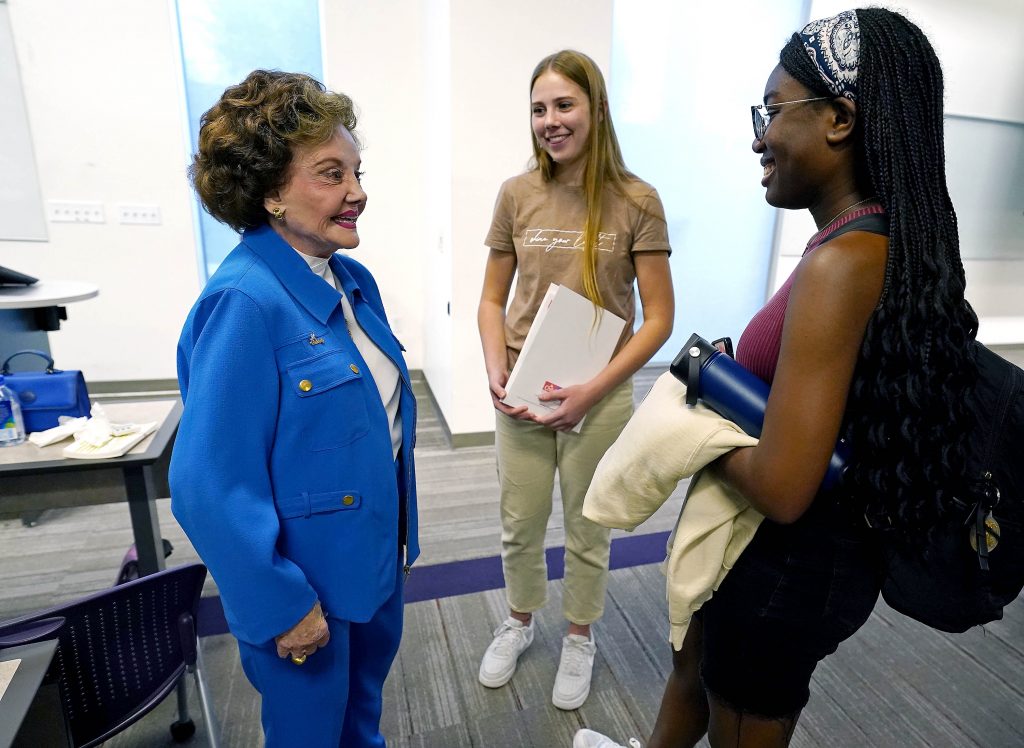
That decision changed everything.
As they walked on the Tokyo streets outside the hotel, O’Meara and Fedderson couldn’t believe what they saw – 11 children huddling under an awning with no shoes or jackets, children they brought back to their hotel room.
“You don’t know what you’ve done,” the colonel assigned to the tour told them.
They learned these were “throwaway children” born of mixed race to Japanese women and American soldiers – children everyone turned their backs on, but not O’Meara and Fedderson.
They tried to place them at an orphanage the next day, though orphanages would not take them, either. O’Meara and Fedderson would eventually find a woman, Kin Horushi (“Mama Kin”), who already was housing 10 orphans in her home. She agreed to take them in. American soldiers passed a hat at their show to help out.
“This is no accident,” O’Meara said of that moment. “God wants us to take care of these children.”
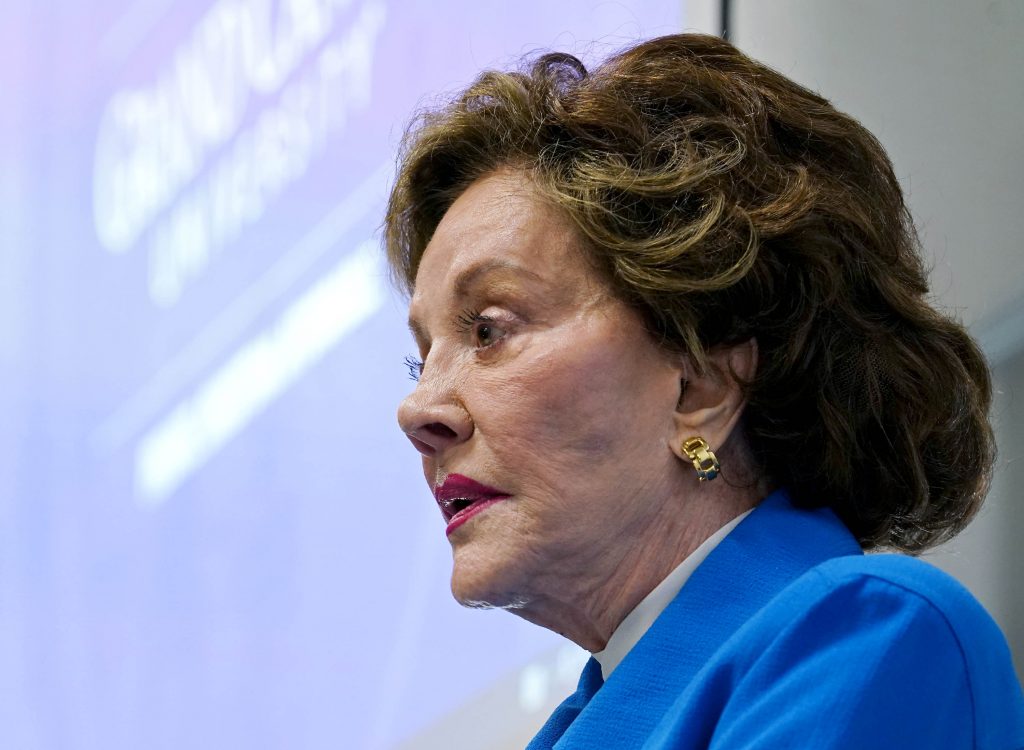
That was the beginning of Childhelp, a national nonprofit headquartered in Phoenix that has evolved over seven decades from building orphanages to establishing a national child abuse hotline to building a network of residential treatment villages, group homes and adoption agencies.
It is the largest nonprofit in the nation dedicated to helping victims of child abuse and neglect, as well as at-risk children.
O’Meara and Fedderson have now come to GCU and are in the early stages of discussions to partner with the University on research and to possibly bring a Childhelp center to campus.
“What brought us here was mainly the love of God,” said O’Meara of wanting to partner with GCU, “and that we’re coming from the same place.”
She believes 100%, “When God is first in your life, you find the answers to life.” For her and Fedderson, and for GCU, “It’s about serving others.”
Dreaming big
One of the most indelible ways the University has served others: the groundbreaking Students Inspiring Students scholarship to support vulnerable inner city K12 students.
Since the program began in 2016, the University has awarded 738 full-tuition SIS scholarships to students in the Canyon Corridor, a hardscrabble section of Phoenix where many immigrants and refugees have settled – where hope for the American dream is high, but so is poverty.
GCU also supports undocumented students through TheDream.US scholarship.
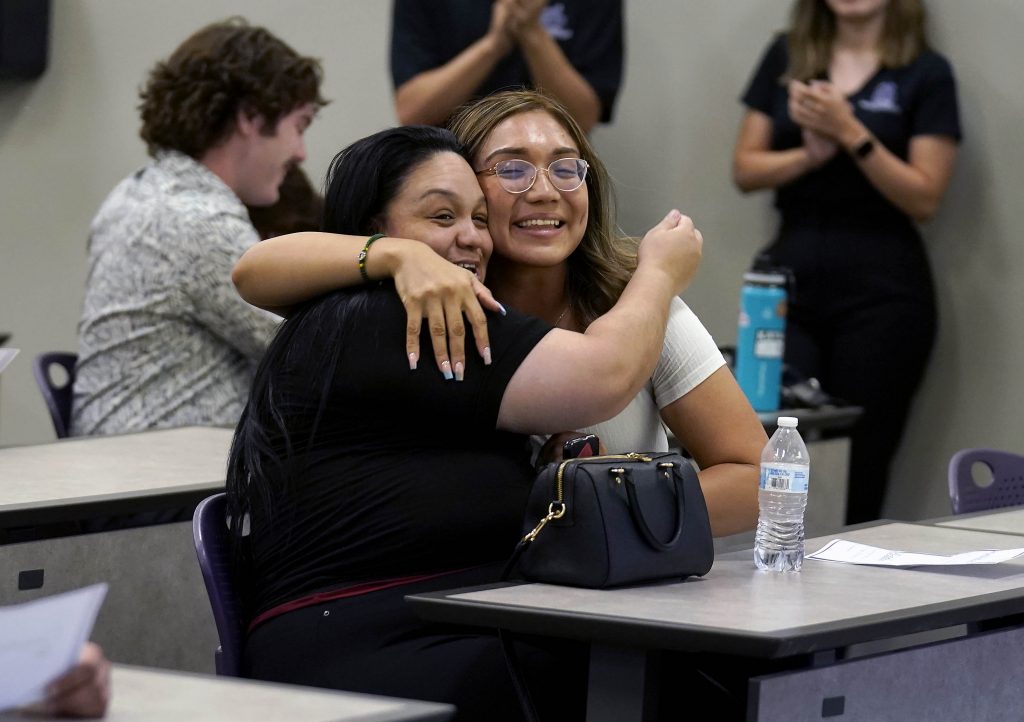
“We want it to be spoken of just as much as our other scholarships because it’s imperative to this neighborhood,” said Director of K12 Outreach Jenn Mitchell.
Those undocumented students, she said, feel like they belong nowhere.
“They’re terrified to fill out applications. They’re terrified to check a box. They think, ‘If I check the wrong box, they’re coming to take my entire family away.’ They have so much fear in them and, yet, they are so bright and have so much to offer.”
Those scholarships have changed the trajectory of families’ lives.

More than 200 SIS program students have graduated from GCU. The hope is that they’ll remain in west Phoenix and invest in it, just as the University has invested in them.
Mitchell said GCU wants to transform even more lives as SIS, in its final year, transitions in the fall to a new program, Canyon Rising.
“SIS was so successful, we wanted to change the model a little bit and scope and scale it,” said Mitchell.
Instead of supporting 100 students annually with a college education, Canyon Rising will award three times as many – 100 with full tuition, housing and meal plans, and 200 commuters with free tuition.
Embracing their gifts
The University is changing the lives, too, of adults with intellectual disabilities through the LOPES Academy at the Cardon Center.
Don Cardon, CEO of the Cardon Development Group, got to know Mueller in 2011, when they spoke on radio shows together about entrepreneurship. At the time, Cardon was director of the Arizona Commerce Authority.
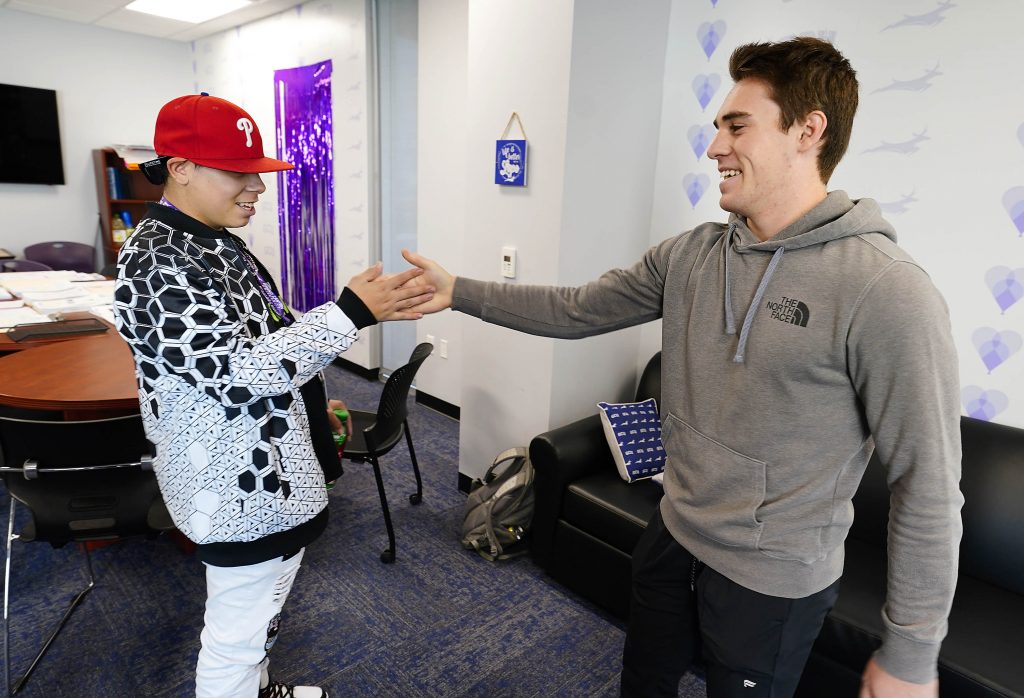
So when it came time to find someone to turn his and wife Kim’s vision into a reality – to create a college program for neurodivergent adults like their daughter, Emma – they immediately thought of Mueller and GCU.
The two-year nondegree program, launched in 2021, focuses on internships and jobs for a vulnerable population whose chances of gaining employment are low. Unemployment for neurodivergent adults runs as high as 30-40%, which is eight times the rate for those without disability, according to the University of Connecticut’s Center for Neurodiversity and Employment Innovation.
The academy is in its third cohort of participants, with GCU hiring four program alums so far.
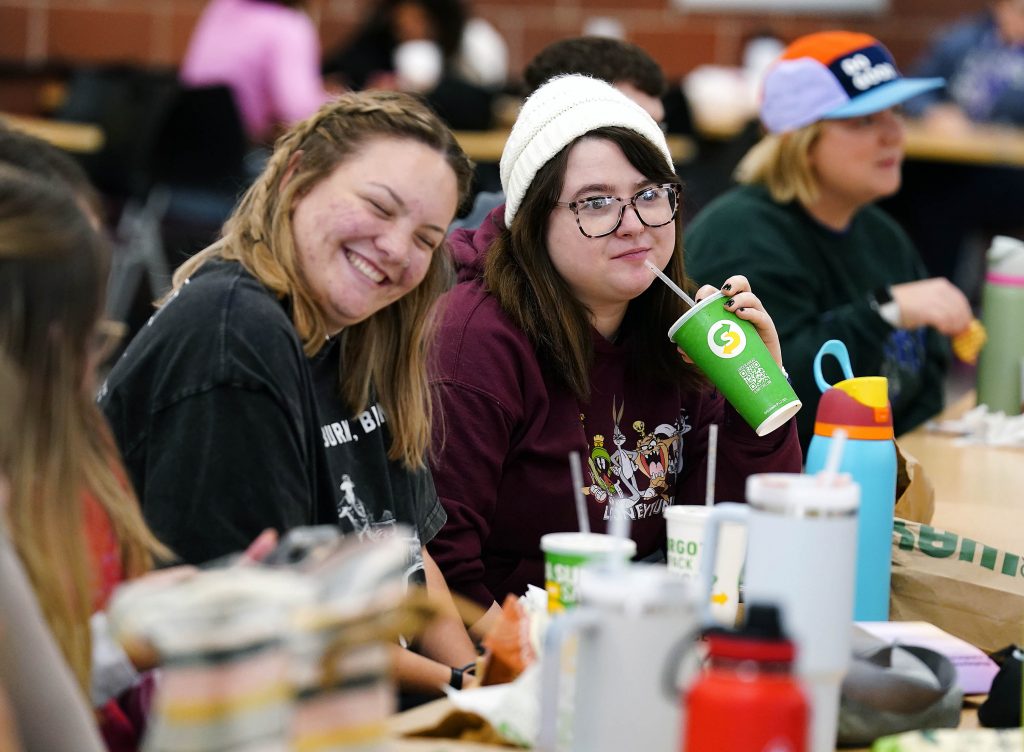
“As Christians, we totally believe that we’re all created in God’s image. This population has gifts and talents and a calling,” Kim Cardon said at the academy’s opening in 2021. “I think just having a heart to create a place like this, it makes me emotional.”
Radical thinking
GCU’s heart for vulnerable populations has sparked a major academic initiative, in its early stages, to establish an institution to research these at-risk groups and bring best practices to light on recovery techniques.
Dr. Sherman Elliott, dean of the College of Humanities and Social Sciences, sees graduate-level learners coming to GCU to get valuable firsthand experience with child-abuse trauma.
Behavioral health students in his college, through the Changing Lives Outreach, are already going into schools and other community organizations to support marginalized groups, from youth mentorship to refugee support.
Mueller said the University will continue to embrace these vulnerable populations – as Jesus did, as he believes we are all called to do.
He references the Roman emperor in the Bible speaking of Christians and how they don’t just care about their poor, but the Romans’ poor, too.
“This was radical thinking that you would take care of the poor or vulnerable the way Christians were motivated to do it because they saw Jesus do it,” Mueller said. “I still think it’s true. I still think it’s true.”
As a Christian university, caring for the vulnerable defines who GCU is.
Mueller said the community will continue to look to GCU for the kind of compassion that will bring about prosperity, transformation, and ultimately, human flourishing.
“People are going to keep coming,” Mueller said.
And when they come, GCU will say, “Yes, we’ll do it.”
Manager of Internal Communications Lana Sweeten-Shults can be reached at [email protected] or at 602-639-7901.
Related content:
GCU News: Honors students learn of Childhelp's impact
GCU News: Fostering Futures students share big dreams for a better life
GCU News: Nursing graduate to mom: 'I know she sees me and is proud of me'
GCU News: Film features LOPES Academy participant



































































